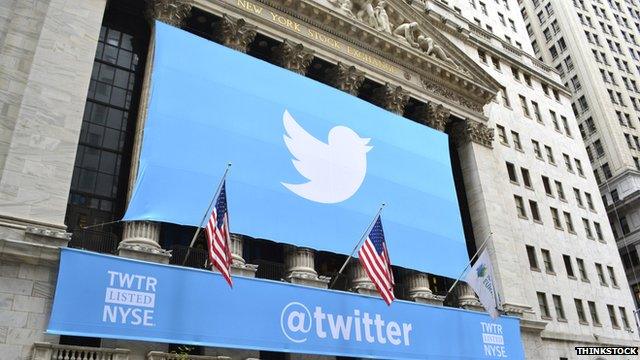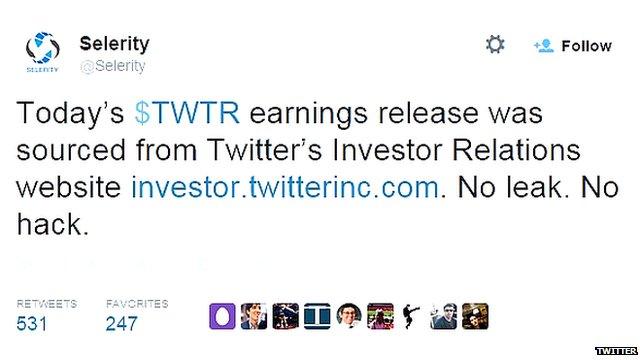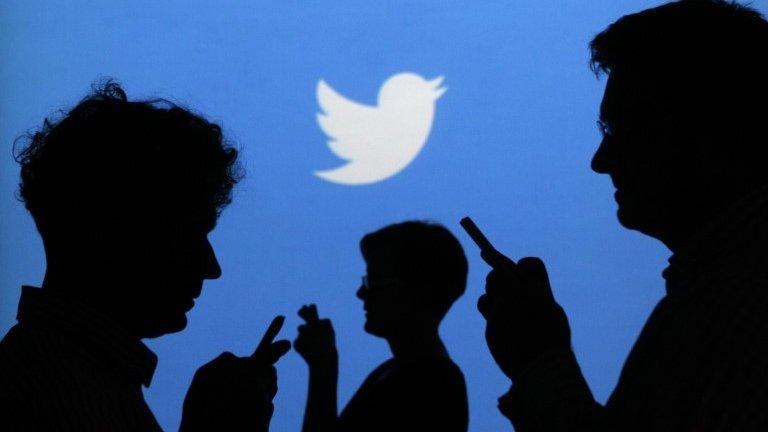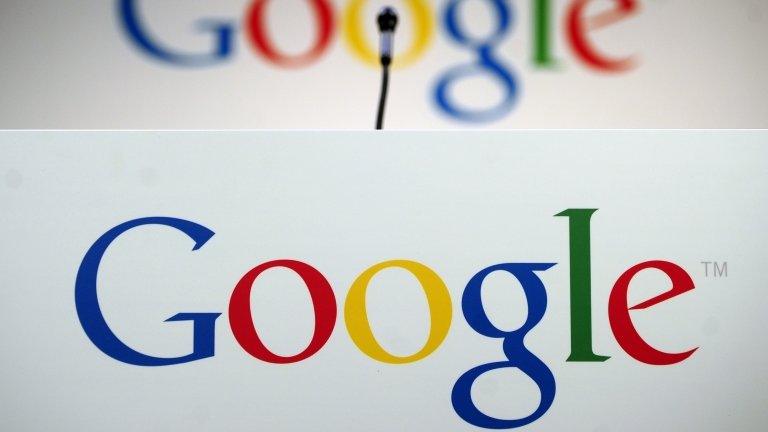How one tweet wiped $8bn off Twitter's value
- Published

Twitter had its worst day on Wall Street since its initial public offering (IPO) on 7 November 2013
By any measure, Twitter hit particularly rough conditions on Tuesday night, which sent its share price into a tailspin.
At one point in the final hours of trading, the stock had lost more than $8bn (£5bn), or 25% of its opening price.
It seems investors were spooked by the early and unintended publication of earnings results that should have been presented after the markets had closed.
So how did that happen, and why did it result in Twitter's worst day on the markets since its flotation?

What actually happened?
Twitter was due to announce its earnings for the first quarter of the year after close of trading on the New York Stock Exchange, where the company is listed.
Announcing results after the markets close gives investors a chance to digest the news, sleep on it, and then start trading again the next day.
Except it turns out that somebody thought it would be a good idea to release this information early, on the technology-led Nasdaq-run investor relations page for Twitter.
Initially it seemed no-one really noticed the error, until a well-placed tweet highlighted the mistake and revealed Twitter's disappointing results.
The markets were still trading, and Twitter had not had the chance to formally present its results in a statement that would have bathed them in a more flattering light.

How come Selerity got the news early, and who are they anyway?
This is the interesting bit.
Selerity is a tech start-up running a very specific service catered to investors.
It automatically scans all sorts of documents, press releases, and social media online and looks for anything that could prove useful to investors.
It then reports back to subscribers with what it describes as real-time actionable intelligence.
In this case, it picked up the early Nasdaq posting.
The company then tweeted the figures under the hashtag "#breaking", ensuring that the world and his dog would know of Twitter's failings through its own service.
Selerity then tweeted its source, external, adding to Twitter's embarrassment by making it clear that the results had been neither leaked or hacked.

Selerity tweeted explaining how it had got Twitter's financial results early
Shares in Twitter lost 6% before trading in the stock was momentarily suspended.
When trading resumed, the stock plummeted a further 19%, before finishing 18% down on the day.
To put this into perspective, at its low point Twitter had the total value of UK supermarket chain Sainsbury's or slightly more than the value of the Dixons Carphone group wiped off its share price.

So who is to blame?
Well, it seems that Nasdaq slipped up here after Twitter furnished the exchange with earnings details ahead of time ready for official publication.
It is like someone breaking an embargo on a news story.
The key factor in Tuesday evening's fiasco was that Selerity's automatic computer programs, called bots, which scan the web for juicy financial details, were able to find the mistake so quickly.
Selerity then made sure that everyone knew about it through Twitter's own platform, but it did not break any rules in doing so as the results had already been published and were effectively in the public arena.
Nasdaq blamed the error on a division of its business called Shareholder.com, which provides investor relations services.
"The posting was caused by an operational issue that exposed the release on Twitter's IR website for approximately 45 seconds," Nasdaq said.
"During those seconds the site was scraped by a third party that publically disseminated the earnings information.
"We regret the incident and remain fully committed to providing the highest quality investor relations communication product and services to our clients."
It is not the first time this has happened. Six months ago, Nasdaq accidentally published JPMorgan's quarterly results hours before close of trading.
Selerity has form here too. In 2011, it caused Microsoft to officially release its financial earnings early after finding the results had been posted on a little-visited part of its website.
It has all left Twitter, which did not have great news to share with investors anyway, somewhat red-faced.
"We asked the New York Stock Exchange to halt trading once we discovered our Q1 numbers were out, and we published our results as soon as possible thereafter," said Twitter's senior director for investor relations, Krista Bessinger.
"Selerity, who provided the initial tweets with our results, informed us that earnings release was available on our Investor Relations site before the close of market.
"Nasdaq hosts and manages our IR website, and we explicitly instructed them not to release our results until after the market close and only upon our specific instructions, which is consistent with prior quarters.
"We are continuing to investigate with them exactly what occurred."

Was the tweet the only reason Twitter stock crashed?
No. The results were fairly disappointing, with Twitter missing market analysts' revenue expectations of $456m by $20m.
Forecasts for future revenue were downgraded.
Twitter chief executive Dick Costolo said he was "disappointed" by the figures.

Is there any good news from Twitter?
Well, it also announced a couple of new things that could help the platform.
Its content will be more closely integrated with Google search, and it is working with Apple so tweeted content will also appear more prominently in Spotlight searches on iOS and OS X devices.
It is also planning to curate timelines for users so, at least in theory, the more relevant tweets from people they follow will bubble up to the top of their feeds.
Presumably for @twitter, those will most definitely include tweets by @selerity.
- Published28 April 2015

- Published18 October 2012
